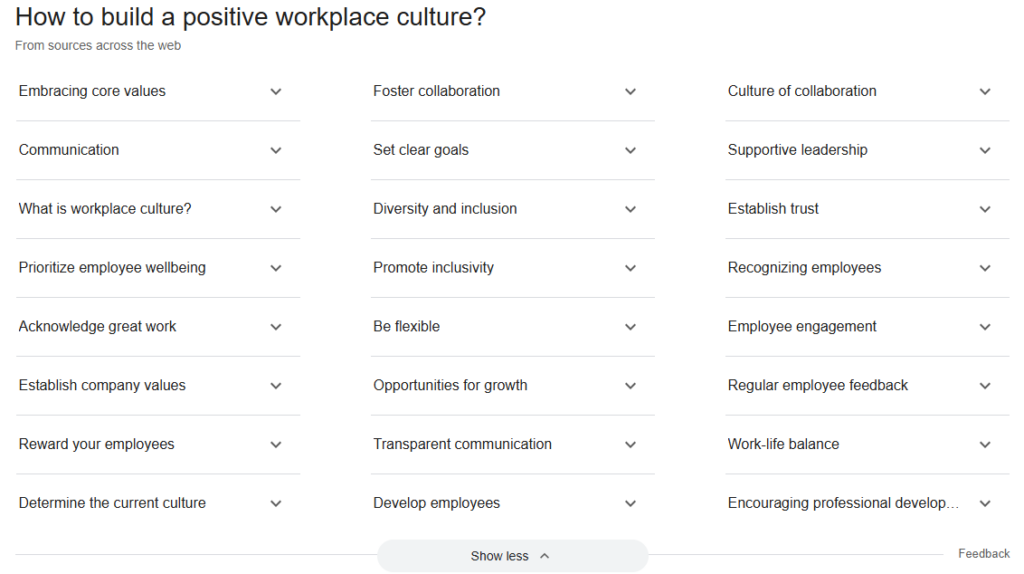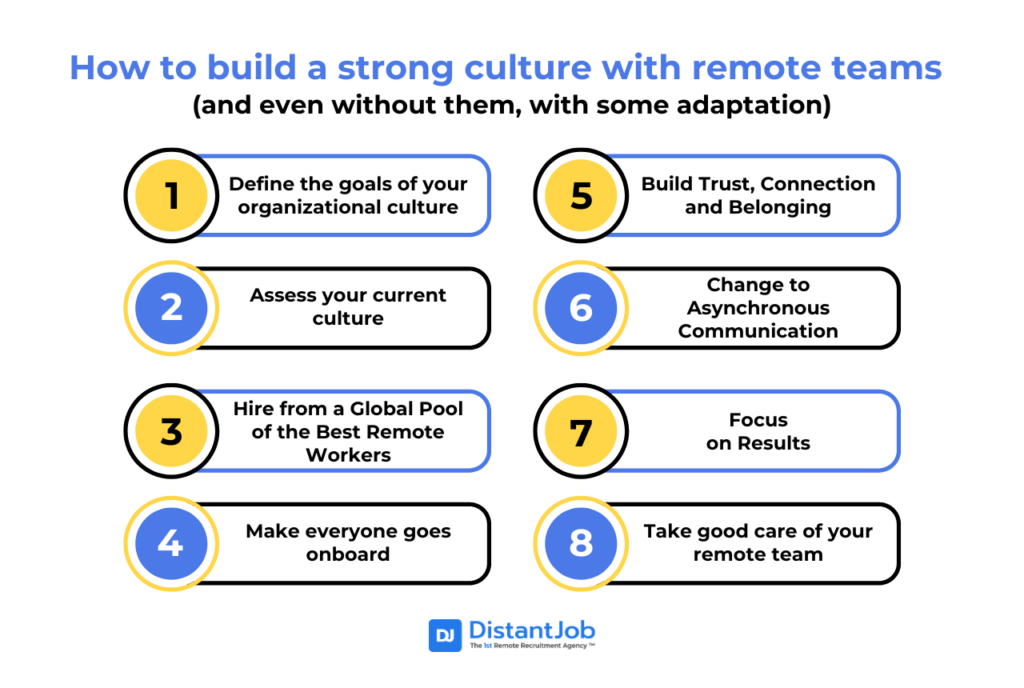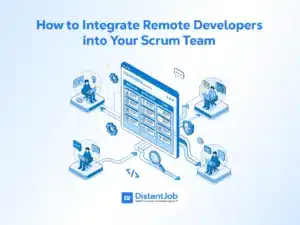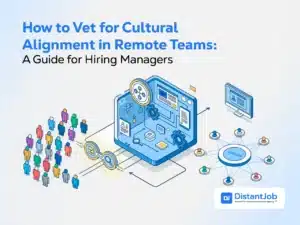Over the past years, many companies that had never tried remote work finally tasted the forbidden fruit. Although the practice is not new, it was new to many organizations and an invitation for a greater transformation. That’s where they converted themselves into remote company cultures.

Here are some examples that I can think of: Github, Slack, Doist, Kumospace, X/Twitter (Yes, Elon Musk banned it for a time, but he regretted it) Zapier, SkillShare, Automattic, Groove, Podia, Button… the list is huge.
The benefits of a remote-first culture are wide-ranging and impactful. They benefit both employees and the organization. Remote-first means that remote work is the main form of operation, offering several advantages compared to traditional or hybrid models.
A remote-first culture ensures that all employees, regardless of where or when they work, have equal access to opportunities and feel like they belong. This sets a precedent that allows the company to maintain and improve operations regardless of external events.
Remote workers tend to be, on average, 35-40% more productive than their office-based counterparts, with an increase in output measured at least 4.4%. It is better to let them work when they feel most productive than to make them work at a set time.
According to Forbes, remote workers produce work with 40% fewer quality defects than in-office workers. Not only that, remote employees feel better about themselves, which means better retention, lower absenteeism (41% less than non-remote), and higher productivity. Employees feel more connected and have a greater sense of purpose when the culture prioritizes their needs. This is why remote company culture works so well!
Companies can save between $10,000—$11,000 per year per part-time remote worker, or 21% higher profitability. Reducing fixed costs, such as office space, contributes to these savings.
Let’s not forget that a remote-first company has access to a deeper talent pool. Diversity of global perspectives and skills drives sales! LinkedIn made a survey and 60% of the respondents believe that “diversity within their sales team has contributed to their teams’ success”. Another study says that 75% of consumers feel influenced by diversity while purchasing products and services.
I can talk all day long about how remote lives have a better quality of life (nobody likes commuting), how you can scale by simply increasing your workforce, and how having many different people under your umbrella makes your company able to achieve your goals rather than just hiring people from your town.
The thing is, to get all these benefits, it’s crucial to build a remote-first culture with a focus on trust, autonomy, inclusion, and transparent communication. These things do not build themselves alone, so you have to put your back into it. Your company must adapt its processes, infrastructure, and everything to support a global workforce.
Stop it, I can read your mind!
“This is too much work, I would have to change my whole business model and my company culture from scratch to accommodate this remote shtick!”
This is not true. I wouldn’t ask you to sell your company and start again from day one.
You don’t necessarily need to change your entire business model and organizational culture from scratch to build a remote company culture. However, it usually takes a significant mindset shift and a deep adaptation to turn your business into a remote-first culture.
But don’t worry, a remote-first culture is not an instantaneous model of “all or nothing”. The transition to a remote-first culture can be gradual. You can start by implementing policies and processes that prioritize remote work, and over time, your organizational culture will evolve to align with this approach.
Lucky you! You have me to help you to do that! I have twenty years of experience on the subject, and I will gladly share my passion for remote work with you.
What is a Remote-First Culture?
A remote-first culture is a company culture where we consider everyone to be remote by default, even if you still have people working together in person. This means that the company will do everything with remote workers in mind.
In a remote-first company, remote work is the main mode of operation. So it’s different from a hybrid model or an occasional practice or perk. The company adapts its entire operation for a remote work experience, regardless of employees’ location.
In other words, to create a remote-first culture, you need to develop a remote mindset. This means treating the needs of remote workers as the default way of working rather than as an afterthought or a fix.
A remote-first culture seeks to create a sense of belonging and equal opportunities for all employees, regardless of where or when they work. It is intentionally inclusive and creates equal opportunities for everyone, removing geographic barriers.

Employees in a remote-first culture often are free to choose their preferred work hours and location. Trust and autonomy are important pillars. A remote-first culture values productivity and efficiency, allowing employees to work during the hours they are most productive.
It’s important to distinguish between remote-first and remote-friendly: Remote-friendly companies allow employees to work remotely sometimes, but the majority of work is done in the physical office. Remote work is considered a perk. In contrast, at a remote-first company, remote work is the default; it’s a given, written into the company’s heart.
How to shape your culture into a remote-first culture
I am not gonna lie: If you already know how to positively transform your company culture all by yourself, all you need to do is adapt it to build a strong culture in remote teams. There is no big secret.

However, the reason why “culture” is one of my favorite buzzwords is that many people talk about it, and no one seems to truly understand it.
This is why I’ve decided to share my definition of culture. It is not as widespread as those mouthful definitions as I saw out there, but it is what works for me, for my company and I dare to say, for many of my clients.
(I mean, Wikipedia says something like “values and behaviors that contribute to the unique, social and psychological environment of a business”. Investopedia says, “the beliefs and behaviors that determine how a company’s employees and management interact and handle outside business transactions”. I don’t get it all. Am I the only guy who doesn’t understand it?)
When I search on Google, this is what Google suggests to me:

As you can see with your own eyes, all of those things do not require a water cooler or physical presence.
For me, company culture means investing in people to feel more connected to your company, both employees and customers. If you build this connection and if you transform your whole company into a community, that is your company culture.
8 Steps to Build a Remote Culture with Your Team

So, I am going to share with you how to build a strong culture with remote teams and even without them, with some adaptation.
Step 1: Define the goals of your organizational culture
Before you do anything else, it’s crucial to determine what you want to achieve with your culture.
What behaviors and values do you want to encourage?
For most of the remote teams (I mean, the ones in good companies), this might include strengthening collaboration (despite the distance), fostering a sense of belonging, maintaining productivity in a flexible work environment, and ensuring employee well-being.
Let me share with you this framework proposed by professors Quinn and Rohrbaugh: “Competing Values Framework” (CVF). This method helps managers to analyze their companies’ culture.
It sounds very complex and academic, but it is simple: All you have to do is to answer these simple questions:
- Internal vs. external focus: Do I want the focus of my remote team to be on competitiveness (Internal) or collaboration (External)?
Before you ask me which one is better for remote teams, it is collaboration (External Focus). Competition is about people fighting each other to show “who is boss”; in remote teams, that can lead to bottlenecks and sabotage. Collaboration is not just safer; it is crucial.
- Flexibility vs. stability: Do I want my team to be flexible, or do I want to micromanage them every day of my life?
A micromanaged team, remote or otherwise, produces nothing (unless you are hiring clueless people; in that case, what is wrong with you? Hire experts now!).
Let your team do their thing. You wish them to be flexible and adaptable, to answer quickly to the changes of the market, solving problems on time.

3. Four cultural typologies: do you wish your culture to be like one of those?
🏢 Which Remote Work Culture Fits Your Company?
Click on a cultural typology to explore its values and leadership style.
🔥 Adhocracy Culture
Dynamic, innovative, and entrepreneurial. Adhocracy companies embrace change, take risks, and push bold ideas.
🚀 **Best for:** Startups, creative industries, and tech-driven businesses.
👤 **Ideal Leader:** Visionary and innovative—someone who thrives in fast-paced environments.
📈 Market Culture
Competitive, results-driven, and customer-focused. This culture prioritizes profitability and efficiency.
💰 **Best for:** Sales-driven industries, marketing agencies, and goal-oriented businesses.
👤 **Ideal Leader:** A results-focused competitor who thrives in high-stakes environments.
🤝 Clan Culture
People-oriented, teamwork-driven, and collaborative. Clan cultures emphasize strong interpersonal relationships.
👨👩👧👦 **Best for:** Remote teams, small businesses, and companies that prioritize employee well-being.
👤 **Ideal Leader:** A facilitator and team builder who fosters connection and engagement.
🏛 Hierarchy Culture
Structured, process-oriented, and rule-driven. This culture provides stability and order.
🏢 **Best for:** Finance, healthcare, manufacturing, and large corporations.
👤 **Ideal Leader:** A structured, detail-oriented manager—but flexibility is needed for remote teams.
⚠ **Caution:** Hierarchy culture does not work well in remote settings unless micromanagement is reduced.
None of those types are set in stone. In fact, for me, the best orientation for a remote-first culture is a mix of Adhocracy and Market. To be both innovative and answer quickly to the market’s feedback is key for any company worth its name.
And the best way to do that is by using a remote-first approach. A remote team with an all-star team, the best of the globe, will bring you innovation and speed.
Step 2: Assess your current culture
Understanding the existing culture is key. Even in a remote environment, some norms and behaviors shape the employee experience. You can use a variety of tools to collect both qualitative and quantitative data.
For example, you may conduct video conference interviews with remote team members to understand how they perceive communication, support, and a sense of community within the company. It may be a one-to-one or a large meeting.
I have been defending the value of a short weekly meeting for a while and of daily reporting as well, so I believe that if you do it, you can easily pinpoint your culture and track it.
Anonymous surveys like the Organizational Culture Assessment Instrument (OCAI) may give employees their much-needed voice and assess the real state of your current culture as well.
Step 3: Hire from a Global Pool of the Best Remote Workers
Instead of hiring the best workers in your town, hire the best remote employees in the world. It makes no sense to hire locals if you are going to build a remote workforce culture. They will cost you the same salary as in your country and deliver the same results; instead, look for those across the globe who will cost you less and achieve more for you.
With DistantJob, you will reach the best candidates on Earth, who will fit both your culture and budget. And we will deal with your paperwork and contracts, so you can focus on the things that really matter to your business: 💵.
Step 4: Make everyone goes onboard
Do you wish your remote team to be clueless about their work? Yeah, I thought so. This is why you are going to spend some time to ensure the success of their onboarding process. What’s key to successful onboarding is setting expectations.
I say this often and I will say it again: the onboard meeting is one of the most important steps on how to build a strong culture with remote teams. A hire under a good onboarding process raises their productivity by 70%.
What does a hire need to know?
- Company culture
- Boss and immediate team
- Why is the remote worker being hired
- What do you expect from them?
- The project where they will work on
- Expected tangible and intangible Values derived from the Project
- Metrics to measure these values
- How them will be able to impact on the project and its metrics
Prepare an onboarding document for your team. Assign every new employee a “work buddy” to help the new hire adjust to the new environment. And finally, give them time to learn and adapt. Entering a new company is not easy; any new hire needs to learn at their own pace.
Step 5: Build Trust, Connection and Belonging
For me, the essence of company culture is Connection. Most people do not realize it, but to build a culture in remote teams is to create exceptional teams. Your company invests in culture when it invests in activities, processes, and strategies that make people connected to it. Easily put, company culture makes your employees and even your clients feel connected to your company.
Think about it: People feel the need for communities because they provide a sense of belonging, support, shared identity, and connection with others, which are crucial for our emotional and mental well-being; essentially, communities help us feel less alone and more valued within a group with shared interests and experiences. The trick here is to stop looking at your company as just a business but as a community as well.
Company culture is even more important while dealing with remote teams, because they cannot see each other. They need a sense of belonging.
According to a Jobvite study (2024), 31% of Active Job Seekers are looking for a better company culture, and 27% of the currently employed workers would leave their current jobs for a better company culture in another organization – it is the second biggest reason on why they would leave their companies (the first biggest reason is career advancement).
“Most alarming for employers”, the study says, “24% of workers have left a job within the first 90 days of starting a new role. While this number has decreased by several percentage points over the last three years, it is still concerning that nearly one in four workers acknowledges leaving within three months of beginning a role. The primary reasons for leaving within this three-month period include poor company culture (47%).”
So, it is better to get that company culture working well or your company will hold both clients and employees like a leaky bucket holds water.

First of all, build trust between you and them.
Instruct your virtual team, as soon as they wake up, to answer to you three questions (by audio or text, your call):
- What have you done yesterday for the sake of the project?
- What are you going to do today for the sake of the project?
- What are the difficulties and obstacles while working on the project?
You will build trust, they will remember their tasks every day and you will be able to identify and deal with any obstacles.
Also, meet with them weekly, so your remote hires and you will be on the same page. They will be able to organize themselves towards the goals of the project.
When you build trust, both connection and belonging will come in time.
Step 6: Change to Asynchronous Communication
Asynchronous is a very mouthful word, but it’s easy and you already mastered it. Asynchronous communication is an important part on how to build a strong culture with remote teams.
When you talk to your family and friends on social media, SMS, or Snapchat, you already communicate asynchronously. Every time you laugh at a meme that came a week ago or even an hour ago, you are practicing it. When you answer a message from your family late because you weren’t online, that is asynchronous communication.
Congratulations, now you have to do is to implement it effectively in business.
Information accuracy, clarity, and accessibility significantly affect project success in remote settings, while timeliness did not show a significant direct impact, according to studies from INTI International University.
But you already know that. You have experience with asynchronous communication, all you have to do is set some good practices to guarantee everything will work like a clock in your remote company culture.
You will need a project management tool to set due dates and instructions about tasks, and a chat tool (like Zoom, Discord, or Slack) to talk with via video or text to your remote team.
Step 7: Focus on Results
Your remote company culture will change its focus towards results that can be measured by KPIs. Key Performance Indicators are metrics determined by you to measure the success of your company towards your goals. For instance, your marketing team may have to focus on the lead conversion rate or the cost per acquisition (depending on your business strategies).
Now you won’t have to care about how much time your employees work, but if they deliver their tasks with quality and in due time.
Let’s face it, we are not in the industrial revolution anymore. Tasks done as they should will be better than people working as if they were in an old factory.
There is a book I like to recommend to anyone who wants to understand results over time spent. It’s called The Goal, one of the great management books studied in most MBA programs, written by Eliyahu Goldratt.
Spoiler alert, if anyone cares about that:
Spoiler
Alex Rogo is a manager who can’t get his factory to produce on time. He thought that management was just about keeping people busy, believing that was a sign of efficiency.
Eventually, he finds a mentor named Jonah, who reveals the truth: by keeping everyone busy with meaningless tasks, Rogo’s workers aren’t available to do the tasks that matter to the factory, leading to reduced productivity.
Jonah teaches Alex to identify the factories’s bottlenecks, and how to solve them by focusing on results rather than how the employees spend their time. No one had to be busy 24/7 to make the company succeed and they lived happily ever after.
End of spoiler
The lesson here is: to stop micromanaging your remote team and focus on the company’s tasks. If your customers are happy and you are getting richer by the day, why do you care if your workers spend an hour or an entire day on their tasks? As long as they don’t become a bottleneck, let them go.

Here is how you measure your progress in a remote company culture:
Measuring Progress in Remote Work Culture
Why it matters: A remote business needs clear, measurable objectives to track its culture and productivity.
❌ Bad Example: “Raising sales.”
Why it fails: It lacks specificity. How much? Which product? What timeframe?
✅ Good Example: “Reduce the cost of acquisition of leads from $30 to $20 within three months.”
Why this works: It sets a clear KPI and a defined timeframe.
Why it matters: Once the SMART objective is clear, remote teams need goals that contribute to achieving it.
❌ Bad Example: “Make SDRs work an extra hour per day with no salary increase.”
Why it fails: Remote employees aren’t just time-based workers. Productivity depends on efficiency, not longer hours.
✅ Good Example: “Experiment with leaner ad strategies in Google & Meta Ads to improve ROI.”
Why this works: A strategic initiative aligns with the SMART goal, focusing on **efficiency over effort**.
Why it matters: No strategy is set in stone. Business owners must evaluate KPIs and refine processes regularly.
❌ Mistake: “Assume the strategy works without data.”
Why it fails: A remote company needs performance tracking—waiting too long to adjust leads to wasted resources.
✅ Best Practice: “Use a monthly report to assess KPI trends and optimize processes.”
Why this works: Ensures **continuous improvement** rather than reactive problem-solving.
Step 8: Take good care of your remote team
Good salaries, handsome compensation, and check their well-being often.
It sounds expensive but it’s actually cheaper than hiring your local employee.
For example, a JavaScript developer in the U.S. may cost around $100,000 a year. But if you hire a remote developer from another country with lower quality-of-life costs, like South America, you can halve your expenses and your remote employee will be happy and motivated with your $50,000 per year salary.
For you it’s cutting costs, for him, it’s becoming richer.
Do not forget to check your remote workforce’s well-being. According to EY, 39% of the workers appreciated being checked in and they developed a sense of belonging at work. Caring about your employees will retain them in your company and they will produce more. Never underestimate the power of asking “How are you?”.
Companies in a Remote-First Culture
GitLab
GitLab operates a big platform of the same name, that helps others to develop, protect and operate their own software. This is a remote company culture from the start. They are pioneers just like us in DistantJob. They have around 2,100 team members in more than 65 countries worldwide. You may be interested in their guide to inspire you on how to build a strong culture in remote teams.
According to Darren Murph, Head of Remote:
“Remote is a process”, he says, “It’s a journey. It’s not a binary switch that you flip. Embrace the spirit of iteration, of getting better at remote. Listen to feedback, adjust to feedback. We like to use the term ‘two-way door.’ If you make a change, and it sucks… revert and try something else! It’s a two-way door. We try to do things that are two-way doors; before we press ‘Go,’ do we have the ability to walk back through this thing if it sucks? Do that.”
Pipefy
Pipefy creates AI tools for process management and automation. It allows its employees to work from any place in the world. It only has two real estate offices: one in San Francisco and the other in Brazil. As of January 2025, the company has around 500 employees in every continent. It earned recognition from Deloit as one of the Top 500 fastest-growing companies in November 2024 and from the San Francisco Business Times as one of the Top 100 fastest-growing companies in the Bay area. You may be interested in their IT Guide for Workflow Management.
Drift
Drift, a software developer company for marketing and sales, is one of the best examples of remote company culture done right. The funny thing is, they were once against remote work, but once they tasted the forbidden fruit… it started gradually during the pandemic and now they love it. David Cancel, Drift’s CEO, noticed that their productivity increasing and they changed their mindset forever.
“The hardest part for me in this transition was I had a limiting belief that I couldn’t hire the most senior people…”, he says, “without meeting them in person. But I was forced to do that [when the pandemic started] and once I saw it happen and see those people get integrated and be productive, then… I said ‘Oh, we should do this forever.’”
Cotopaxi
Cotopaxi is an outdoor gear company. CEO Davis Smith was also adamantly against remote workforce culture, but as soon as he realized the results, he quickly embraced it. It only took two months for him to accept changing to a remote company culture. While some of his workforce prefer to go in person to the office, Cotopaxi easily tripled its size due to being fully remote. Scalability in remote-first culture works well, after all, and even during the pandemic, being an outdoor gear company, the company thrived instead of withering.
“There has been a lot of power in us”, says Smith, “saying early on we embrace this new way of working. This is the way of the future: we can either fight it or embrace it and figure it out faster than everyone else.”
Conclusion
The main thing about building a remote company culture is building a company where everyone loves to work. Going remote will open you to the possibilities of scalability, checking results, managing motivation, and employee retention. It will make your company produce as never before. As I stated before, it may sound difficult, but it’s straightforward: let people work from their homes, get some tools to work, change a few management processes and everything will run smoothly.
And yet, you may not feel ready. Maybe even after all that information, you still need guidance to meet your company’s needs. Maybe your company has some specific needs before diving deeper into remote-first culture.
That’s perfectly fine, so, why don’t you share with me what you need? Tell me more about your company and your needs, so I can guide you in the remote direction!





